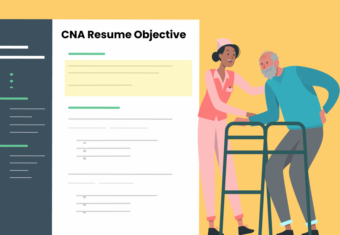A CNA, or certified nursing assistant, is a vital member of any healthcare team. CNAs provide hands-on care to patients in hospitals, nursing homes, and other care facilities.
Due to the nature of the job, you’ll need to prove to interviewers that you possess excellent interpersonal skills as well as the hard skills necessary to safely administer medications and handle medical equipment.
Common CNA interview questions
Here are ten common CNA interview questions and answers to help you ace your job interview:
1. Why do you want to be a CNA?
The daily duties of a CNA can be both physically and emotionally demanding. Depending on the day and the facility you work in, you might help bathe patients, move medical equipment, or help calm patients in distress.
Employers need to know you’re motivated enough to handle the diverse tasks associated with being a certified nursing assistant.
How to answer this question
When explaining why you want to be a CNA, make it clear that you understand that the job can be challenging at times, but that you’ll be able to overcome those challenges to ensure the well-being of your patients.
If you have a personal reason for wanting to become a CNA, mention that as well.
I’ve always been drawn to work that involves caring for others. I’m aware the job can be stressful, but I saw first hand the difference CNAs can make in the lives of their patients when my grandma ended up in the hospital two years ago. She still lights up when she talks about the CNA who spent a few extra minutes chatting with her every time he brought her meals.
2. What would you do if a patient refused care?
Not all patients will be equally cooperative. If you’re faced with a situation where a patient refuses to follow instructions or take their medication, you’ll need to be able to handle it without losing your patience.
How to answer this question
In your answer, highlight your soft skills and talk about how you would approach the situation with compassion, care, and respect for the patient.
I’d first talk to the patient to assess the situation and try to figure out what was wrong. After that, I’d either address the issue myself or approach my supervisor to discuss what we could do to ensure the patient felt safe and comfortable in our care.
3. Why should we hire you?
This is one of the most common nursing assistant interview questions employers ask candidates. What they’re looking for is an answer that shows them what differentiates you from other applicants.
How to answer this question
Prove that you understand the requirements of the role and that your CNA skills and experience makes you well-suited to work at your target healthcare facility.
During my three years as a nursing assistant, I’ve learned what it takes to provide quality care. I’ve also developed excellent communication skills through interacting with patients, families, as well as other nurses and doctors. Additionally, your nursing home’s commitment to improve each resident’s quality of life resonates with me, and I’d love to help you achieve this goal.
4. What is your greatest achievement as a medical professional?
Employers ask this question because they want to know if you’ll simply perform the duties required of you, or if you’ll go above and beyond for your patients.
How to answer this question
If you’ve been in the medical field for a long time, you likely have many notable accomplishments that come to mind. However, pick one that showcases particularly relevant skills that prove you’re a good fit for the role.
During my time as a CNA, I’ve had the privilege of working with dozens of patients from different backgrounds. They’ve all helped me hone my skills as a healthcare professional, but one of my greatest achievements was helping a patient who was dealing with dementia. This patient would often become agitated and confused, but with patience and understanding, I was able to help him feel safe with us. I’m so proud to have been able to make a difference in this man’s life.
5. Why do you want to work at our health facility?
There are many hospitals, nursing homes, and rehabilitation centers out there. This question helps hiring managers gauge whether you’re applying to any healthcare facility with an opening or if you’re specifically interested in working as a CNA at their facility.
How to answer this question
Before going into the interview, do some research on the facility to find out what they’re known for. Then, bring that up during the interview.
Your hospital enjoys an excellent reputation as a world-class institution at the cutting-edge of innovation. Ever since completing an internship here last year, I’ve been excited at the prospect of honing my skills as a CNA while working alongside and learning from your competent team of doctors and nurses.
6. How would you handle a disagreement with a nurse or doctor?
Hospitals and care centers can be stressful environments, so it’s important to show that you can handle any disagreements that might arise between you and other members of the team while performing your duties.
How to answer this question
The best way to tackle this behavioral interview question is by providing an example of a time when you dealt with a workplace disagreement in the past. Hospital hiring managers know that conflicts sometimes occur, it’s how you navigate them while keeping the patients’ best interest in mind that matters.
At my previous workplace, there was a nurse who would repeatedly lose her temper with the residents. Other members of the team had confronted her about it previously, but her behavior didn’t change.
Following one of these incidents, I approached the nurse in question and calmly informed her that her behavior was affecting the well-being of the residents. After explaining to her how her actions negatively affected the people she was responsible for taking care of, she started making an effort to change.
7. What are your strengths as a CNA?
This question is a chance for you to show off your best qualities, but it’s also a chance for interviewers to learn if you understand what makes a good CNA. If you lack previous work experience as a CNA, mention transferable skills that make you suitable for the job.
How to answer this question
It might be tempting to bring up all your good qualities, but it’s better to focus on one or two highly relevant skills that make you a good fit for the role. Anything that makes you great at caring for patients, working in a healthcare facility environment, or even working as part of a team would be a good answer.
My greatest strength as a CNA is my ability to stay calm under pressure. I have a good amount of experience in the medical field, so I’m familiar with the kind of unexpected situations that can occur while working in a hospital.
8. What are your weaknesses as a CNA?
A mistake many job seekers make when answering the question “what is your biggest weakness?” is that they mention a quality that isn’t truly a weakness. For example, an applicant for a CNA position might say that they work too hard, or that they care too much. These aren’t the kind of answers interviewers are looking for.
How to answer this question
It’s best to prepare an answer before the interview so you’re not left struggling to come up with an appropriate response on the spot. You don’t want to leave hiring managers thinking you’re unsuitable to be a CNA. Everyone has weaknesses, but what you should do is demonstrate what steps you’ve taken to overcome them.
One aspect of the job that I struggle with is time management. As a certified nursing assistant, I’m responsible for many different tasks throughout the day and sometimes it’s difficult to keep track of all of them and make sure they’re completed in a timely manner. To stay organized, I’ve started writing down the tasks I need to finish before the end of my shift so it’s easier for me to plan my day.
9. How would you deal with an aggressive patient?
There are many reasons why patients sometimes lash out. They might be in pain, they might be struggling with withdrawal symptoms, or they could be suffering from mental illness. Knowing how to handle aggressive patients without losing your cool is an important skill to have as a CNA.
How to answer this question
Don’t tell the interviewer that your first course of action would be to physically restrain the patient. Dealing with aggressive patients requires patience, de-escalation skills, and a desire to understand why they’re acting the way they are. In your answer, show the interviewer your compassionate and rational side.
First, I’d talk to the patient to try to understand what might be causing their behavior. If they were agitated because they were scared or in pain, I’d help them feel more comfortable. If that didn’t work and the situation started getting out of hand, I’d ask for assistance from my supervisor or another member of staff.
10. What do you think will be the biggest challenge in this role?
Because the responsibilities of a certified nursing assistant are so diverse, you’re bound to encounter challenges at some point in your career. Hiring managers want to know if you’re equipped to deal with those challenges.
How to answer this question
Focus on an aspect of the job that most people would find challenging, but that isn’t going to seriously impact your ability to perform your duties as a CNA. Also, mention how you’re going to tackle that challenge.
This way, you show employers that you’re aware it can be a demanding job, but that you’re prepared for it and won’t become overwhelmed.
I think the biggest challenge for me as a CNA will be adjusting to the hours. I’ve never worked night shifts before, and I imagine it’ll take some time to get used to it. I’ll need to make sure I plan my daily schedule well and create good routines.
Questions to ask an employer at a CNA interview
The last question an interviewer will ask is usually “do you have any questions for me?”.
Interviews aren’t just an opportunity for employers to weed out candidates, they’re also a chance for you to find out if the health facility you’ve applied to is the right workplace for you.
Here’s a list of relevant questions to ask your interviewer when applying for a job as a certified nursing assistant:
- What is the workplace environment like?
- What kind of patients/residents do you take care of at your facility?
- What qualities do the most successful CNAs at your facility have in common?
- What would my daily responsibilities be?
- How do you handle patient care when there’s a shortage of RNs or CNAs on duty?
- What is the staff-to-patient ratio?
- What kind of training is provided to new CNAs?
- Can you tell me about the team I’d be working with?
- What development opportunities are offered to staff members?
Additional resources for CNAs
Now that you know how to prepare for your interview, here are some more resources to help you put together a great CNA job application:
Click to rate this article
4.9 Average rating















